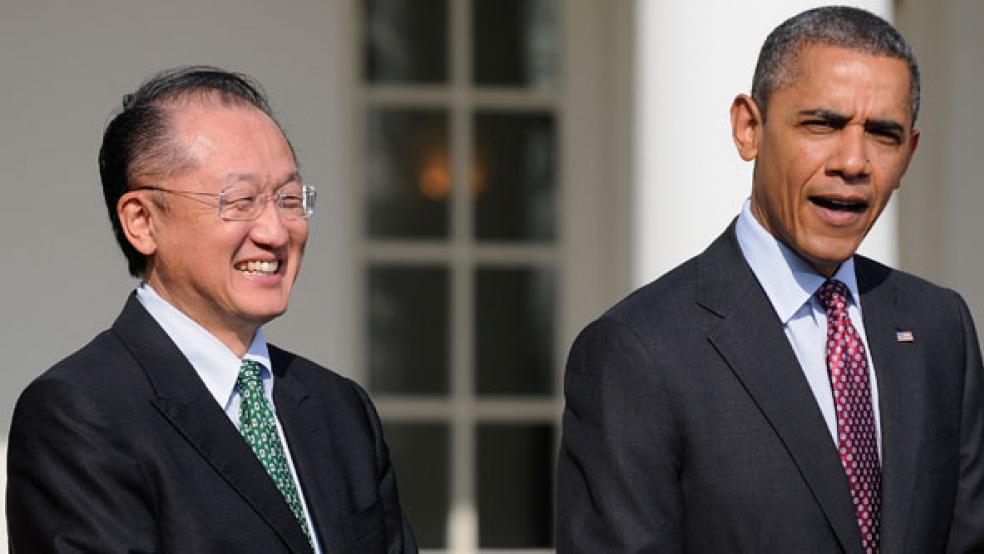President Obama’s nomination of Jim Yong Kim to lead the World Bank has been called “inspired.” I call it revealing. That Obama tapped Kim is not so surprising; they have much in common. They both lived abroad as children, they are products of Ivy League schools and both have worked as professors and in civic organizations; both lean left.
They also have this in common: just as critics of the President argue that his credentials for his current post were slim, Dr. Kim’s resumé to lead the World Bank comes up short. Unlike most former World Bank chiefs, Kim has never been involved in finance. That President Obama would be impervious to this hole in Dr. Kim’s background reflects his utter disdain for the financial sector and for America’s business community in general. In Mr. Obama’s world, bankers are greedy and undisciplined “fat cats” who brought the world to its knees and, more importantly, created a recession whose continuing impact threatens his administration.
Dr. Kim is an impressive person – a scientist accomplished in health ministry and more recently acclaimed as the president of Dartmouth College. But, he is not a banker – no more financially literate until very recently than, say, a prosperous shoe salesman or race car driver. As the Economist put it recently, the World Bank’s “boss needs experience in government, in economics and in finance.” The World Bank does, after all, lend money; indeed, as of the last annual report, it had $43 billion in loans outstanding.
Not only does the President have no understanding of the financial arena, but he also cannot imagine that those who manage Goldman Sachs or JP Morgan Chase have any special expertise. How would he? Unless he is raising campaign funds, he does not mix with Wall Street.
If you produce electric cars or solar panels, the President has your back. Otherwise, you’re a corporate blood-sucker.
Unhappily for the nation, that same antipathy extends to most of the business community, with a few exceptions. If you produce electric cars or solar panels, the President has your back. Otherwise, you’re a corporate blood-sucker. He does not see social good in the process of creating value and wealth. Obama does not share the view that those things might go hand in hand – and also produce much-needed jobs.
Unfortunately it is also not the view of Dr. Kim. In a book entitled Dying for Growth, Dr. Kim wrote “the quest for growth in GDP and corporate profits has in fact worsened the lives of millions of women and men.” That is a stunning statement, especially for the incoming head of an organization that spends billions of dollars generated mainly by those hateful “corporate profits” to alleviate poverty. Just as Supreme Court Justice Sotomayor survived the “empathy” test, Dr. Kim seems to have passed the anti-business test.
The good news is that Dr. Kim acknowledges his deficiencies and recognizes that our financial leaders might know something important. Having to deal with actual management issues at Dartmouth, Dr. Kim confronted his ignorance. A couple of years ago the Dartmouth president famously confessed to a Wall Street Journal reporter that he “had never been involved with investments. I had no idea what a hedge fund was.”
Because the financial crisis had sucked a cool billion dollars out of Dartmouth’s portfolio – a loss that created serious budget distress – Dr. Kim received early and intense investment tutelage from Dartmouth alum Bill Helman, principal at venture capital powerhouse Greylock Capital. He has also reached out to celebrated hedge fund Lone Pine founder Steve Mandel, who heads the college’s endowment committee, to review their investment approach in light of recent losses.
No administration in the country’s history has been so aloof from the business community, or so stuffed with academics.
President Obama has yet to concede that he needs help. Indeed, one of the most exasperating aspects of the Obama presidency is its continuing isolation. Despite the discouraging pace of economic bounce-back, the White House is confident it has all the answers. Corporate types invited to participate in Obama’s Council on Jobs and Competitiveness describe the president’s attitude as detached and uninterested. The head of that group, GE CEO Jeffrey Immelt, is rumored to have become one of the White House’s fiercest critics.
No administration in the country’s history has been so aloof from the business community, or so stuffed with academics. When Bill Daley was brought on board as chief of staff, it appeared to signal awareness of this deficiency. Daley was a long-time banker and served on several major corporate boards. Most visibly, he was part of JP Morgan Chase’s management team. He didn’t last long.
Traditionally, Democrat presidents hire business leaders to serve as Commerce Secretary or to head Treasury. Obama broke with that tradition. His picks for both (Gary Locke and Tim Geithner) were long-time civil servants and politicians. To replace Mr. Locke, who has since become ambassador to China, the president broke down and tapped business leader John Bryson, former head of Edison International, a California power company deep into green energy. Edison touts itself as the number one purchaser of renewable energy in the U.S. as well as the owner of the country’s largest electric vehicle fleet -- the President’s kind of guy.
Despite some opposition (many are calling for a change-up in the tradition which allows the U.S. to determine the World Bank head and are proposing alternatives), Dr. Kim will likely move to that prestigious organization. He is unquestionably intelligent, and will be a quick study on the finer points of managing a multi-billion loan organization. The good news is that unlike our foundering president - he will probably ask for help, from people who actually know what they are doing.




